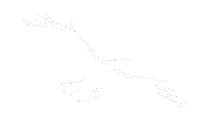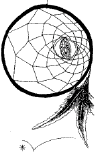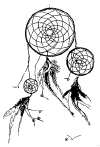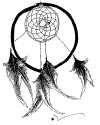Verb Categories and Conjugation
A, B, and C forms of a Verb
There are three forms of a verb in Ojibwe language:
A form or independent
order is used in simple sentences and in main clauses of complex
sentences.
B form or conjunct order
is used in subordinate clauses of complex sentences and in
questions with words who, what, when, where, why, etc.
Besides usual B form, there is also B form with an
inital vowel change, also called changed conjunct. These two
variants of B form are used in different types of subordinate clauses. See
Ojibwe Sentences
C form or a participle
is a verb form which is used instead of a noun, naming an object.
Participles also often work as English adjectives, qualifying nouns (sharing
this role with preverbs). Since almost all equivalents of English adjectives
are verbs in Ojibwe, combining with nouns to qualify them, they often turn
into participles:
Niwaabamaa a'aw memengwaa mekawaadizid. - I see
that beautiful butterfly.
Participle answers the question "who?", or "what?" The
correct sense of it could be translated as "someone/something, who/which is
doing smth", or "someone/something, who/which is smth":
Niwaabamaag degoshingig. - I see those who
arrived.
Participles are very widely used in Ojibwe. Besides nouns
there are also some names for people, objects, animals, e.g., "gekinoo'amaaged"
(teacher), gekinoo'amaawind" (student), "bemisemagak" (airplane), "detebised"
(wheel), etc., which are used as nouns, but in fact are participles.
Verb Categories
There are four verb categories in Ojibwe:
Verbs animate inransitive (vai)
Verbs inanimate intransitive (vii)
Verbs transitive animate (vta)
Verbs transitive inanimate (vti)
Note. Transitivity. Check
these examples:
1) I walk (I am walking) , you go (you
are going), he stands (he is standing), we live (we
are living) - verbs animate intransitive;
2) It works (it is working), it rains
(it is raining), it shines (it is shining), it
falls (it is falling) - verbs inanimate intransitive;
3) I see him, you hear me, he knows us,
I remember you - verbs transitive animate;
4) I see it, you hear it, he knows it,
I remember it - verbs transitive inanimate.
Can you check the difference between the first 1) and 2)
lines and the last 3) and 4) lines? Verbs in the last two lines are used
with words 'him', 'me', 'us', 'you', 'it'. These words are called objects.
Objects could be also nouns: I see a boat, you hear a bird, he
knows John. Such verbs which can take objects are called transitive
verbs. Verbs in the first two lines can't take objects (just logically) -
these are intransitive verbs, they have only subjects (those, who are doing
actions are called subjects.)
In English it is not vital to know if a verb is transitive
or intransitive. In Ojibwe it is. In English you can say: I eat, I eat it, I
know, I know him, I know it. We use the same verbs both with and without
objects. We just don't care about it.
In Ojibwe if a verb is intransitive, you can't use an
object with it. At all. If you need to add an object you need to use a
transitive verb. If you need to add an animate object you need to use an
animate transitive verb, and if you need to add an inanimate object, you
need an inanimate transitive verb.
That's why in Ojibwe there are three different verbs
'eat', three different verbs 'know', three different verbs 'hear', etc.
1. Verbs animate intransitive (vai)
Verbs animate intransitive (vai) � are used with an
animate subject and no object:
wiisini he eats, he is eating
niminikwe I drink, I am drinking
aakoziwag they are sick
baapi he laughs, he is laughing
gibakade you s. are hungry
Verbs conjugate i.e. change their form depending on person
and number.
Personal pronouns are not used in conjugation. Personal prefixes and
suffixes (affixes) are used instead:
|
Affix:
|
| I, me |
ni-(verb) |
| You s. |
gi-( verb) |
| S/he |
(verb) |
| We (exc) |
ni-( verb)-min |
| We (inc) |
gi-( verb)-min |
| You pl. |
gi-( verb)-m |
| They |
(verb)-wag |
The main verb form of Ojibwe verbs is 3d person singular.
It means that a verb itself stands in 3d person singular and is translated
as: wiisini = (he) eats, minikwe = (he) drinks, etc. That's why in 3d person
singular vai verbs don't take affix.
Personal prefixes change slightly depending on the sound
following after them:
ni- before w, z, n, m;
nin- before d, g, j;
nim- before b;
nind- before any vowel; |
gi- before any consonant;
gid- before any vowel |
|
wiisini - eats
|
izhaa - goes
|
| ni-wiisin |
I eat |
nind-izhaa |
I go |
| gi-wiisin |
you eat |
gid-izhaa |
you go |
| wiisini |
s/he eats |
izhaa |
s/he goes |
| ni-wiisini-min |
we (exc) eat |
nind-izhaa-min |
we (exc) go |
| gi-wiisini-min |
we (inc) eat |
gid-izhaa-min |
we (ins) go |
| gi-wiisini-m |
you pl. eat |
gid-izhaa-m |
you pl. go |
| wiisini-wag |
they eat |
izhaa-wag |
they go |
For more examples see
Verb Paradigms.
Note. If a vai verb ends in a short vowel /i/ or /o/, this
vowel will be dropped in 1 and 2 person singulars:
wiisini (he eats) - niwiisin
(I eat) - giwiisin (you eat)
gawishimo (he lies) - nigawishim (I lie) -
gigawishim (you lie).
If a vai verb starts with "o", this vowel will lengthen
into /oo/ taking personal prefix:
onjibaa (he is from such a place) - nindoonjibaa
(I am from such a place)
Let's examine B form suffixes for this category using two
vai verbs izhinikaazo (he has a name, he is called) ending in a vowel, and
dagoshin (he arrives) ending in a consonant:
| I |
izhinikazo-yaan |
dagoshin-aan |
| you s. |
izhinikazo-yan |
dagoshin-an |
| s/he |
izhinikazo-d |
dagoshin-g |
| we exc. |
izhinikazo-yaang |
dagoshin-aang |
| we inc. |
izhinikazo-yang |
dagoshin-ang |
| you pl. |
izhinikazo-yeg |
dagoshin-eg |
| they |
izhinikazo-waad |
dagoshino-waad |
There are only three tenses in Ojibwe: Present, Past
and Future.
Past Tense forms by adding a
past tense prefix /gii-/. The past tense prefix stands after personal
prefixes:
|
wiisini - eats
|
izhaa - goes
|
| nin-gii-wiisin |
I ate |
nin-gii-izhaa |
I went |
| gi-gii-wiisin |
you s. ate |
gi-gii-izhaa |
you s. went |
| gii-wiisini |
s/he ate |
gii-izhaa |
s/he went |
| nin-gii-wiisini-min |
we (exc) ate |
nin-gii-izhaa-min |
we (exc) went |
| gi-gii-wiisini-min |
we (inc) ate |
gi-gii-izhaa-min |
we (inc) went |
| gi-gii-wiisinim |
you pl. ate |
gi-gii-izhaa-m |
you pl. went |
| gii-wiisini-wag |
they ate |
gii-izhaa-wag |
they went |
In changed B form past tense prefix /gii-/ changes into /gaa-/.
(See also:
Questions with: who, what, when, where, why, etc.)
Future Tense is formed in two
different ways:
1) Simple future is formed with a prefix /ga-/ for 1st and 2nd person
and with prefix /da-/ for 3d person.
2) Future with meaning of wish or want, is formed with a prefix /wii-/.
Future with /wii-/ is usually translated as «want to do smth.» or «going to
do smth.», and future with /ga-/ and /da-/ - as «will (definitely) do»:
|
wiisini - eats
|
izhaa - goes
|
| nin-ga-wiisin |
I will eat |
ni-wii-izhaa |
I am going to go |
| gi-ga-wiisin |
you (s) will eat |
gi-wii-izhaa |
you s. are going to go |
| da-wiisini |
s/he will eat |
wii-izhaa |
s/he is going to go |
| nin-ga-wiisini-min |
we (exc) will eat |
ni-wii-izhaa-min |
we (exc) are going to go |
| gi-ga-wiisini-min |
we (inc) will eat |
gi-wii-izhaa-min |
we (inc) are going to go |
| gi-ga-wiisini-m |
you (pl) will eat |
gi-wii-izhaa-m |
you (pl) are going to go |
| da-wiisini-wag |
hey will eat |
wii-izhaa-wag |
they are going to go |
In changed B form future tense prefix /ga-/ changes into /ge-/
and /wii-/ into /waa-/. Future tense prefix /da-/ in some regions changes
into /de-/, and in others into /ge-/. (See also:
Questions with: who, what, when, where, why, etc.)
Note. Verb tenses are formed the same way for all verb
categories.
2. Verbs transitive animate (vta)
Verbs transitive animate (vta) � are used with an animate
subject and an animate object:
nindamwaa opin � I eat potato (opin/potato (singl) �
animate noun)
nindamwaag opiniig � I eat potatoes (opiniig/potatoes (pl))
nimbaabaa niwaabamaa � I see my father
giwaabamaa a�aw ikwe � you s. see that woman
niwaabamaanaan a�aw ma�iingan � we (exc) see that wolf
giga-waabamin � see you later (gi-ga-waabam-in � I will see you)
This is the most difficult verb category. Vta verbs change
their form depending on both subject and object person and number. Variety
of forms could reach some hundreds or more.
Examples of vta verb conjugations see in
Verb Paradigms.
3. Verbs transitive inanimate (vti)
Verbs transitive inanimate (vti) � are used with an
animate subject and an inanimate object:
nimiijiin wiiyaas � I eat meat (wiiyaas/meat � inanimate
noun)
giwaabandaan o�ow jiimaan � you see that boat
niwaabandaamin o�ow jiimaan � we (exc) see that boat
niwaabandaanan iniw jiimaanan � I see those boats
Vti verb conjugation depends on subject person and number
and on object number.
There are two classes of vti verbs depending on a verb stem ending,
consonant (class 1) or vowel (class 2). Suffixes for these two classes
differ slightly.
Examples of vti verb conjugations see in
Verb Paradigms.
4. Verbs inanimate intransitive (vii)
Verbs inanimate intransitive (vii) � are used with an
inanimate subject and no object:
waawiyeyaa = it is round
waabishkaa = it is white
michaa = it is big
inaande = it is of such color
bizhishigwaa = it is empty
Note. To these verbs suffix /-magad/ could be
added, it has no special sense and doesn't change the sense of the verb:
waawiyeyaa-magad = it is round
inaande-magad = it is of such color
Vii verbs have much less forms, than verbs of other
categories.
Examples of vii verb conjugations see in
Verb Paradigms.
Among vii verbs there are also so called "weather" verbs:
gimiwan - rain, it is raining
zoogipon - snow, it is snowing
zaagaate - sunny, it is sunny
gizhaate - hot, it is hot
gisinaa - cold, it is cold
noodin - wind, it is windy
waaban - dawn
gii-gimiwan bijiinaago = it rained yesterday.
da-zaagaate waabang = it will be sunny tomorrow.
FREELANG OJIBWE DICTIONARY - free downloadable Ojibwe-English &
English-Ojibwe dictionary form
Freelang.net.
White Eagle Soaring: Dream Dancer of the 7th Fire

See
Real Dream Catchers' links
This is a crazy world. What can be
done? Amazingly, we have been mislead. We have been taught that we can
control government by voting. The founder of the Rothschild dynasty, Mayer
Amschel Bauer, told the secret of controlling the government of a nation
over 200 years ago. He said, "Permit me to issue and control the money of
a nation and I care not who makes its laws." Get the picture? Your freedom
hinges first on the nation's banks and money system. That's why we
advocate using the
Liberty Dollar, to understand the
monetary and banking system. Freedom is connected with
Debt Elimination for each individual. Not
only does this end personal debt, it places the people first in line as
creditors to the National Debt ahead of the banks. They don't wish for you
to know this. It has to do with recognizing WHO you really are in
A New Beginning: A Practical Course in Miracles.
You CAN
take
back your power and
stop volunteering to pay taxes to the collection
agency for the BEAST. You can take back that which is yours,
always has been yours and use it to pay off your debts. And you can send
others to these pages to discover what you are discovering.
Disclaimer: The
statements on www.real-dream-catchers.com have not been evaluated by the FDA.
These dream catchers are not intended to diagnose nor treat nor cure any
disease or illness
© 2007, Allen Aslan Heart / White Eagle Soaring of the Little Shell Pembina Band, a
Treaty Tribe
of the Ojibwe Nation






 Get
a course to promote your business online, explode your sales
Get
a course to promote your business online, explode your sales Get
software to promote your business online in less time
Get
software to promote your business online in less time Get
software to streamline your business and run it hands free.
Get
software to streamline your business and run it hands free.